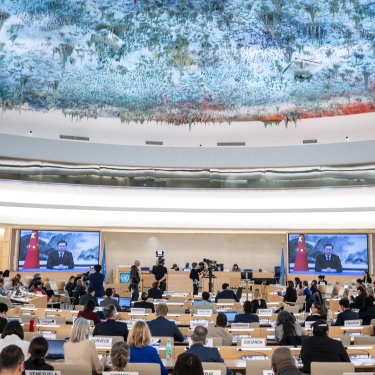RSF urges UN Member States to block China’s ill-founded bid for continued membership in the Human Rights Council

In light of the Beijing’s widespread and systematic violations of press freedom and the right to information in mainland China and in Hong Kong, as well as its attempts to disrupt UN activities focused on these issues, Reporters Without Borders (RSF) urges the United Nations General Assembly (UNGA) to vote against China’s re-election to the United Nations Human Rights Council (UNHRC).
On 10 October 2023, UNGA will elect 15 States (of a total 47 seats) to the UNHRC. China, which is currently a Council member, is running for re-election. Since its election to its fifth UNHRC term in 2021, the Chinese regime has remained the world’s worst jailer of journalists and press freedom defenders with at least 114 currently detained, showcasing the country’s continued violations of the universal right to information.
“Providing China, one of the world’s largest press freedom and human rights predators, with a platform to further influence and subvert international norms greatly endangers the right to information around the globe. We urge all UN members to vote against China’s re-election to the Human Rights Council and call on States to build up pressure to secure the release of all journalists and press freedom defenders detained in both China and Hong Kong.
China’s notoriously appalling prison conditions imperil the lives of journalists like Zhang Zhan, detained since 2020 for reporting on the Covid-19 pandemic in Wuhan. In July 2023, Zhan weighed only 37 kilograms despite her height of 1.7 metres – half of what she weighed prior to her detention. Huang Xueqin is another independent journalist at high risk who was tortured in detention and recently tried for “inciting subversion of state power” – so far with no verdict publicly announced.
In Hong Kong, the founder of independent media outlet Apple Daily, Jimmy Lai, faces a possible life sentence under the national security law, with his trial scheduled to start on 18 December. Foreign nationals are also not immune to the long arm of state repression, as demonstrated by the 2015 kidnapping in Thailand of Swedish publisher Gui Minhai, who was later sentenced to 10 years in prison despite serious health concerns.
Beijing attempts to disturb UNHRC event on media freedom
In addition to imposing severe restrictions on press freedom domestically, the Beijing regime has attempted to use its influence to disrupt UN activities focused on the situation of human rights and fundamental freedoms in both mainland China and in Hong Kong. When a UNHRC side event focused on media freedom in Kong Kong was announced to take place on 27 September, sponsored by the UK along with 24 co-sponsoring States, the Chinese delegation responded by urging all UN Member States to boycott the event, through a letter reportedly delivered in person to every delegation in Geneva. A similar public statement soon followed from the Hong Kong Special Administrative Region. This call for a boycott backfired spectacularly, resulting instead in attendance by many ambassadors and some international media. A Chinese delegate intervened from the floor to again express China’s strong opposition to the event and insist that rule of law is respected in Hong Kong.
Speaking at the side event, RSF’s Director of Campaigns Rebecca Vincent reminded delegations that the promotion of human rights and fundamental freedoms is among the very goals of the UN as set out in its legal framework. She noted that the Chinese mission’s claims that fundamental freedoms, including media freedom, were respected in Hong Kong, “could not be further from the truth,” stating that “in the 21 years that RSF has been producing the World Press Freedom Index, we have never seen such a sharp and rapid deterioration in the press freedom record of any country as we have noted in Hong Kong.”
Regime continues the harassment of press freedom defenders
The following day, on 28 September, China’s targeting of individuals and organisations who cooperate with UN bodies on human rights issues in China and Hong Kong was condemned in the UN Secretary-General’s annual report on reprisals. In particular, reprisals against Sebastien Lai, the son of Jimmy Law, and their international legal team, were highlighted, following their advocacy with UN bodies focused on the case of Jimmy Lai and the use of the national security law to target journalists and pro-democracy campaigners in the territory.
Although this year’s Asia Pacific region election has the same number of candidates as available seats, UNHRC members can only be voted in with the support of an absolute majority (97 votes) of the General Assembly. According to UNGA Resolution 60/251, Member States should “take into account the contribution of candidates to the promotion and protection of human rights” when casting their ballots.
Since Chinese leader Xi Jinping took power in 2012, he has been conducting a large-scale crusade against journalism, as revealed in RSF’s report published in December 2021 The Great Leap Backwards of Journalism in China, which details Beijing’s efforts to control information and media within and outside its borders.
Ranking 179th out of 180 in the 2023 RSF World Press Freedom Index, China is the world's largest captor of journalists and press freedom defenders, with at least 114 currently detained.
